Détail de l'auteur
Auteur C. Parra-López |
Documents disponibles écrits par cet auteur (20)
 Ajouter le résultat dans votre panier Affiner la recherche
Ajouter le résultat dans votre panier Affiner la recherche
Article
The intensification of agriculture is a primary driver of global biodiversity decline. In response, the European Union (EU) is promoting a transition towards sustainable, biodiversity-friendly agriculture. This article explores how digital/4.0 t[...]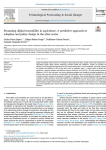
Article
Digital traceability systems (DTS) are essential for improving food safety, quality control and transparency in agricultural supply chains, thereby enhancing consumer health and confidence. Despite its potential, the adoption of DTS in tradition[...]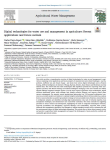
Article
C. Parra-López ; S. Ben Abdallah ; G. Garcia-Garcia ; A. Hassoun ; H. Trollman ; S. Jagtap ; S. Gupta ; A. Aït-Kaddour ; S. Makmuang ; C. Carmona-Torres |This article provides a comprehensive overview of digital technologies for water use and management in agriculture, examining recent applications and future prospects. It examines key water-related challenges - scarcity, pollution, inefficient u[...]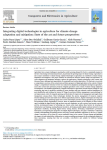
Article
C. Parra-López ; S. Ben Abdallah ; G. Garcia-Garcia ; A. Hassoun ; P. Sánchez-Zamora ; H. Trollman ; S. Jagtap ; C. Carmona-Torres |Agriculture faces a major challenge in meeting the world's growing demand for food in a sustainable manner in the face of increasing environmental pressures, in particular the growing impact of climate change. Agriculture is also a major contrib[...]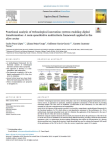
Article
CONTEXT Technological innovation systems (TIS) play a key role in facilitating digital transformation (DT) in various sectors. In agriculture in particular, traditional qualitative assessments of TIS fall short of providing actionable insights. [...]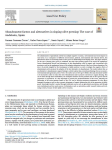
Article
The abandonment of agricultural activity has multiple negative economic, environmental and social impacts in rural areas. As a consequence of different socioeconomic, political, environmental and technical drivers, this phenomenon shows an incre[...]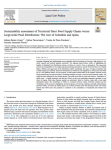
Article
Assessing, designing and implementing more sustainable agri-food systems has become a high priority in scientific research and political agendas worldwide. The ongoing Russia-Ukraine conflict is highlighting the fragility of globalised food dist[...]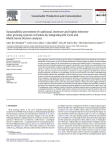
Article
Olive cultivation is the most important agro-ecosystem in the Mediterranean basin. Despite the remarkable intensification of this system (i.e., the use of high tree densities and large amounts of inputs), the environmental and socio-economic imp[...]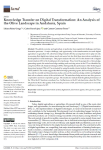
Article
Knowledge transfer on digital transformation: an analysis of the olive landscape in Andalusia, Spain
The global economy, and agriculture, in particular, faces significant challenges and transformation pressures. A major challenge, and opportunity, is the transformation towards digital agriculture or agriculture 4.0, where knowledge transfer (KT[...]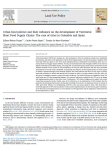
Article
Urban food policies (UFPs) have emerged as a key mechanism to drive the transition towards more sustainable food systems, with cities as the appropriate scale for their implementation. The aim of the paper is analysis of the boost that UFPs have[...]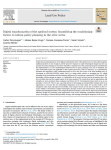
Article
Despite the growing importance of the digital transformation (DT) of the agrifood sector on the political agenda, traditional policies are not enough to provide proactive responses to rapid technological changes and new approaches for policy pla[...]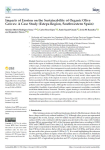
Article
Spain has more than 2.5 M ha of olive groves, with 60% of this area (i.e., 1.5 M ha) concentrated in the region of Andalusia (Southern Spain). Assuming the socio-ecological characteristics of these crops, of which their contribution to ecosystem[...]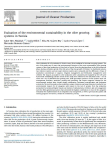
Article
Olive cultivation for oil production in Tunisia covers from traditional to innovate cropping systems. The aim of the study was to assess the environmental footprint of the most representative olive growing systems of the actual production of oli[...]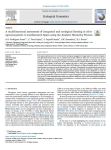
Article
Olive agroecosystems have for several decades undergone management changes aimed to meet the demands of new agricultural policy trends and of consumers and society. While the main role of olive groves is the production of olives and oil, its mul[...]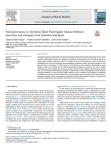
Article
Traditional approaches and debates in Agrifood Governance (AFG) have focused exclusively on the role of market forces and public policies. The emergence of alternative food movements, such as Territorial Short Food Supply Chains (TSFSCs), sugges[...]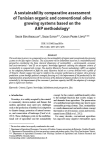
Article
This work aims to assess, in a comparative way, the sustainability of organic and conventional olive growing systems in the Sfax region (Tunisia). This assessment will be undertaken based on I) a multidimensional perspective considering the thre[...]
Article
Cette étude examine l’importance relative de la certification Européenne d'origine (Appellation d'Origine Contrôlée, AOC) par rapport à d’autres attributs extrinsèques (prix et emballage) et intrinsèques (couleur) de l'huile d'olive espagnole da[...]
Article

Article
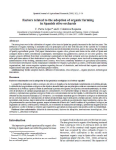
Article
The area given over to the cultivation of organic olive trees in Spain has greatly increased in the last ten years. The diffusion of organic farming is desirable since its principles are in line with the aim of the current EU Common Agricultural[...]








